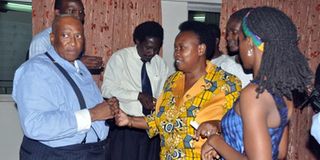Time to tell our stories

Participants chat with Prof Zakes Mda during the conference at Fairway Hotel in Kampala last week. PHOTO by rachel mabala.
Could it be that the main reason many influential Ugandans and Africans are generally reluctant about telling and having their stories published is because they have many skeletons in their closets that would come tumbling out? At least that was Prof Zakes Mda’s fear. It is also the fear of many because the process of writing the life story of oneself is equally the process of coming to terms with his past, which often is a mix of the beautiful and the ugly.
Mda, who delivered the keynote address at the second edition of the Uganda International Writers Conference, an initiative of the African Writers Trust (AWT) at Fairway Hotel Kampala last week, finally overcame his fear and in 2012 published his first creative non-fiction book titled “Sometimes there is a Void: Memoirs of an Outsider.”
“In this memoir, Mda tells the story of a life that intersects with the political life of his country [South African] but at its heart is the classic adventure story of an artist, lover, father and teacher,” notes AWT director Goretti Kyomuhendo. “There’s no denying the raw honesty and inspiring penmanship of this work of note, especially in relevance to our conference theme – “Memoir and Truth.”
Mda, who teaches Creative Writing at Ohio University in the US, believes it is important for the African to tell his story; not the peculiar narrative that reinforces the stereotype of African suffering, but a narrative of an African rising; a narrative of how a poor African child can beat the odds and make it, a genuine portrait of who we are against misrepresentation by outsiders. Writing would also “preserve our disappearing world.”
The five-day event which started on March 1, but was officially opened on March 2nd at Fairway Hotel, brought together nearly 30 African writers of note and supporters of the art from Uganda, South Africa, Nigeria, Kenya, Rwanda, Malawi, Cameroon, Somalia, US, and UK, including our own Daniel Kalinaki, who is basking in critical acclaim for his recent biography of Dr Kizza Besigye, Jennifer Makumbi, UK-based poet Mildred Barya Kiconco and Dr Susan Kiguli, among others. The participants looked into successful literary initiatives, talked about space and identity in African writing, discussed the rise of digital literature and the need to embrace it.




